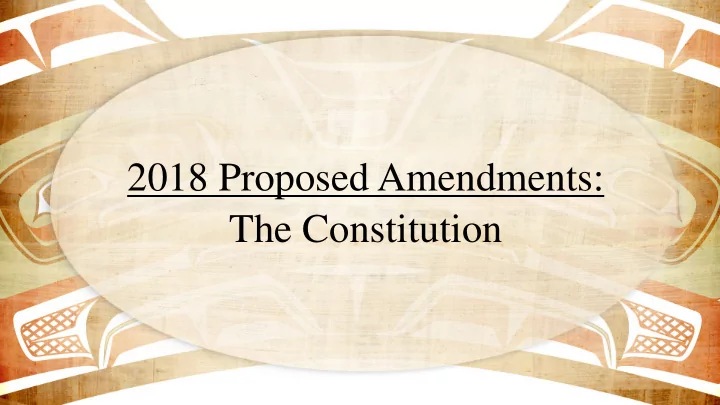

2018 Proposed Amendments: The Constitution
2017 Summary • The 82 nd Tribal Assembly took up the Constitutional Committee’s proposed amendments to the Tlingit & Haida Constitution. • It considered amendments article by article, and made changes to the Preamble and articles I-VI. • The remainder of the Constitutional Committee’s proposal was deferred until the 2018 Tribal Assembly.
2018 Proposal • The Constitutional Committee re-convened after the 82 nd Tribal Assembly. • The Committee chose not to make any changes to its 2017 proposal. • What follows is a presentation regarding the remainder of the Committee’s proposal.
Article VII. Powers of the Governing Body of the Tribe This article articulates the powers specifically invested in the Tribe’s governing body. • The proposed amendments: • • Clarify the Tribe’s ability to manage and protect any tribal trust lands. ( Sec. 1(b, c) ) • Clarify that tribal subsidiaries are also managed by the tribal governing body. ( Sec. 1(p) ) • Clarify that tribal taxation must conform with tribal law, not only federal law ( Sec. 1(n) ) • Specifically authorize the creation of groups/entities for “cultural, educational and environmental” purposes, not just “governmental” purposes ( Sec. 3 ) Technical changes: “the Tribe ” → “ Tlingit & Haida”; “members ” → “citizens” •
Article VIII. Officers and Executive Council This article articulates who are the officer of the • Executive Council and when and how they are elected, and/or removed from office, etc. The proposed amendments: • Remove language restricting the election of • officers to the first Assembly after delegate elections ( Sec. 1 ) Extend the President’s term of office from • two (2) years to four (4) years ( Sec. 1(a) ) Clarify that a session chair, not only the • President, has the authority to vote to break a tie ( Sec. 1(e) ) Technical changes: implement the ampersand •
Article IX. Function of Officers This article contains only technical amendments. • Technical changes: “the Tribe” → “Tlingit & Haida”; “ member” → “ citizen” •
Article X. Functions of the Executive Council This proposed amendment expands the limits on the Executive Council so that the Executive • Council is not just prevented from the amending the Constitution, but also prevented from amending the Rules of Election. The proposed amendment leaves in place the prohibition that the Executive Council cannot take • action to repudiate or negate an action taken at the last Tribal Assembly.
Article XI. Tribal Courts This article contains only technical amendments. • Technical changes: “the Tribe” → “Tlingit & Haida ” •
Article XII. Bill of Rights This article previously articulated • only individual rights. The proposed amendments: • Clarify some protections • Expand the rights of individuals • protected in the Constitution Remove a sentencing limitation • while still requiring compliance with applicable law Create a second category of • rights reserved, collective rights The are no technical changes in this • article
Article XIII. Reservation of Rights and Privileges This article is new. • The article works to reserve to the Tribe and its citizens rights and powers not specifically • delegated in this Constitution. Of note, subsection (b) specifically ensures citizenship requirements will only be changed through • a constitutional amendment process.
Article XIV. Purpose and Principles of Government This article is new. • The article articulates purposes and principles that the Tribe shall follow when it acts. • For example: • The Tribe shall be defend the rights and liberties of its citizens; • The Tribe shall prioritize culture, language and ancestral wisdom when it acts; and • The Tribe prohibits itself from impairing the obligations of contracts already entered into. •
Article XV. Rule of Law This article is new. • The article articulates the principle that the Tribe should act in accordance with laws, in contrast • to acting upon the whims of an individual government official.
Article XVI. Foreign Relations This article is new. • The article invests the President with the authority to engage in foreign relations activities, • including the ability to negotiate treaties and appoint ambassadors. Any treaty, however, must be approved by the Executive Council. •
Article XVII. Adoption and Amendment This article articulates how and by • what standard the Constitution may be amended. The proposed amendment: • Establishes a new standard for • amendments to tribal citizenship requirements, demanding that any such amendments always require a 2/3 vote Technical changes: an illustrative • fraction was added after the phrase “two-thirds”
Questions?
Recommend
More recommend